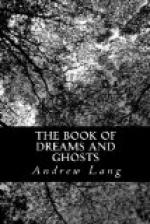Any one who takes these matters seriously, as facts in human nature, must have discovered the difficulty of getting evidence at first hand. This arises from several causes. First, the cock-sure common-sense of the years from 1660 to 1850, or so, regarded every one who had experience of a hallucination as a dupe, a lunatic, or a liar. In this healthy state of opinion, eminent people like Lord Brougham kept their experience to themselves, or, at most, nervously protested that they “were sure it was only a dream”. Next, to tell the story was, often, to enter on a narrative of intimate, perhaps painful, domestic circumstances. Thirdly, many persons now refuse information as a matter of “principle,” or of “religious principle,” though it is difficult to see where either principle or religion is concerned, if the witness is telling what he believes to be true. Next, some devotees of science aver that these studies may bring back faith by a side wind, and, with faith, the fires of Smithfield and the torturing of witches. These opponents are what Professor Huxley called “dreadful consequences argufiers,” when similar reasons were urged against the doctrine of evolution. Their position is strongest when they maintain that these topics have a tendency to befog the intellect. A desire to prove the existence of “new forces” may beget indifference to logic and to the laws of evidence. This is true, and we have several dreadful examples among men otherwise scientific. But all studies have their temptations. Many a historian, to prove the guilt or innocence of Queen Mary, has put evidence, and logic, and common honesty far from him. Yet this is no reason for abandoning the study of history.
There is another class of difficulties. As anthropology becomes popular, every inquirer knows what customs he ought to find among savages, so, of course, he finds them. In the same way, people may now know what customs it is orthodox to find among ghosts, and may pretend to find them, or may simulate them by imposture. The white sheet and clanking chains are forsaken for a more realistic rendering of the ghostly part. The desire of social notoriety may beget wanton fabrications. In short, all studies have their perils, and these are among the dangers which beset the path of the inquirer into things ghostly. He must adopt the stoical maxim: “Be sober and do not believe”—in a hurry.
If there be truth in even one case of “telepathy,” it will follow that the human soul is a thing endowed with attributes not yet recognised by science. It cannot be denied that this is a serious consideration, and that very startling consequences might be deduced from it; such beliefs, indeed, as were generally entertained in the ages of Christian darkness which preceded the present era of enlightenment. But our business in studies of any kind is, of course, with truth, as we are often told, not with the consequences, however ruinous to our most settled convictions, or however pernicious to society.




